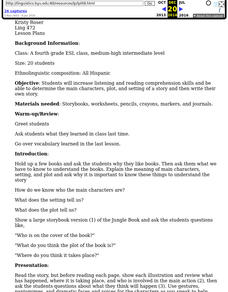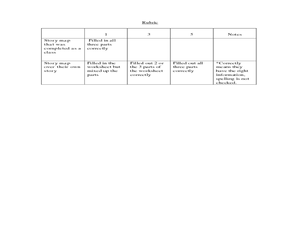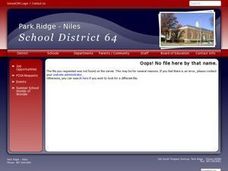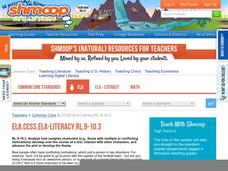Curated OER
Language Practice
The simple instructional techniques described in this plan will help young readers learn and practice basic reading skills and strategies. Before reading, introduce your readers to the meaning of main character, setting, and plot. Then...
Curated OER
Story Stew
Students identify the elements of a story. In this reading and writing lesson, pupils read the book, Tyrone the Horrible by Hans Wihelm and then identify the characters, setting, and plot of the story.This lesson includes adaptations and...
Hawaiʻi State Department of Education
Characters from a Box
Character analysis is a skill we use when we read literary works or want to write a good story. Learners will use drama to practice character analysis while focusing on the details that make characters act the way they do. They'll each...
Fluence Learning
Writing About Literature: Comparing and Contrasting Characters in Heidi
Scholars read excerpts from the story, Heidi, in a three-part assessment that focuses on comparing and contrasting characters. Each part contains three tasks that challenge learners to discuss, answer comprehension...
Core Knowledge Foundation
Fables and Stories Tell It Again!™ Read-Aloud Anthology
A read-aloud anthology focuses on fables. Over three weeks, first graders listen to various stories and then participate in lessons that cover story elements, including plot, characters, setting, and personification and explore...
Curated OER
Setting's Effect on a Character's Actions
Do the actions of a character in a story change based on the setting the writer provides? Learners explore the concept of character action in relation to story setting by investigating the setting and events in the story Science...
Curriculum Corner
Fiction Graphic Organizers
Get an in-depth look into a narrative text with a three-page worksheet that examines a story's character—actions, sayings, thoughts, and appearance—setting, and challenges scholars to write a brief summary about what they've read.
Curriculum Corner
Fiction Graphic Organizers
Accompany fictional reading with a instructional activity that compares a story's characters, setting, and theme.
Freeology
Summarizing
Scholars draft a summary using a graphic organizer featuring a story's characters, setting, main events, conflict, and resolution.
Curated OER
How Characters Get What They Want
Sixth graders analyze the primary force that drives a character's actions in a character analysis lesson. In this character analysis lesson, 6th graders analyze how characters present their actions and participate in a group activity...
Houghton Mifflin Harcourt
Surprise!: Extra Support Lessons (Theme 2)
Surprise! is the theme of a unit covering such topics as consonants, blending, short vowels sounds, high frequency words, and number words. The unit's lessons also include teachable moments covering story structure, illustrations,...
Ed Helper Clip Art
Character Problem Solution
Intended for younger audiences, children identify the main characters, setting, problem, events, and solution in a graphic organizer.
Florida Center for Reading Research
Comprehension: Narrative Text Structure, Story Pieces
An activity boosts reading comprehension by challenging scholars to answer questions about a narrative tale detailing elements—plot, characters, setting, theme, problem, and solution.
Curated OER
Characters' Feelings Or Motives
Fourth graders use the text, "Fair's Fair" to examine how characters' feelings and motives are built throughout a text through descriptive phrases. They look at what a character does and says to record on their writing frames. Finally,...
Curated OER
Special Characters
Young scholars examine the use of HTML codes for ISO Latin 1 characters to display accent marks for non-English letters. They examine how to add spaces between words and letters and override the use of < and > in documents.
Curated OER
An Author Study on Kevin Henkes
To better understand how the author Kevin Henkes uses the theme of friendship throughout his books, learners engage in several compare and contrast activities. The class reads several Henkes titles and discusses the similarities in...
Shmoop
ELA.CCSS.ELA-Literacy.RL.9-10.3
Focus on complex characters with a lesson from a series that teaches individual skills from the Common Core. Specifically, this resource provides practice with standard RL.9-10.3. Get pupils thinking and talking about characters with the...
Curated OER
Letter Sound and Letter Combination Accuracy: Sound Matching Adjectives
Kindergartenrs explore English by analyzing images in a picture book. This lesson on the parts of speech calls for young learners to view a picture book in class and describe characters, settings and objects with adjectives. Then, as a...
Curated OER
Read Aloud- Literary Elements- Prediction
First graders read two stories. In this literary elements lesson, 1st graders read The Hat by Jan Brett, notice patterns of prediction, identify the setting, problem and solution and compare the story to the book The Mitten.
EdHelper
George Washington's Socks by Elvira Woodruff
A solid, straightforward book report form is an excellent addition to your literature unit. Class members note the main characters, point of view, plot elements, and other important details from a story, adding their favorite part...
Mr. Mansour
Ralph S. Mouse by Beverly Cleary
Take an in-depth look into Beverly Cleary's story, Ralph S. Mouse, with a 10-question worksheet that focuses on story elements. Scholars describe the main character, point of view, conflict resolution, and more! Then, conclude with...
Prestwick House
Speak
Speaking your mind and standing up for yourself is the message of Laurie Halse Anderson's novel Speak. Readers review key details about characters, setting, and plot points with a crossword puzzle all about Speak.
Curated OER
Literature and Telecommunications
Students read a novel and write short journal entries about the characters, setting and interesting facts. Using email, they share their responses to the novel with other students at a different school. Student also create slide shows...
Curated OER
Problems and Their Solutions in Stories and Everyday Life
Students identify story elements. In this stories instructional activity, students read a story and identify the chracter, character traits, plot, setting and theme. Groups of students match problem and solution cards.
Other popular searches
- Setting Plot Main Characters
- Main Characters and Setting
- Plot, Characters and Setting
- Main Character and Setting
- Plot Characters and Setting
- Setting and Characters
- Plot Setting Characters
- Setting Characters























